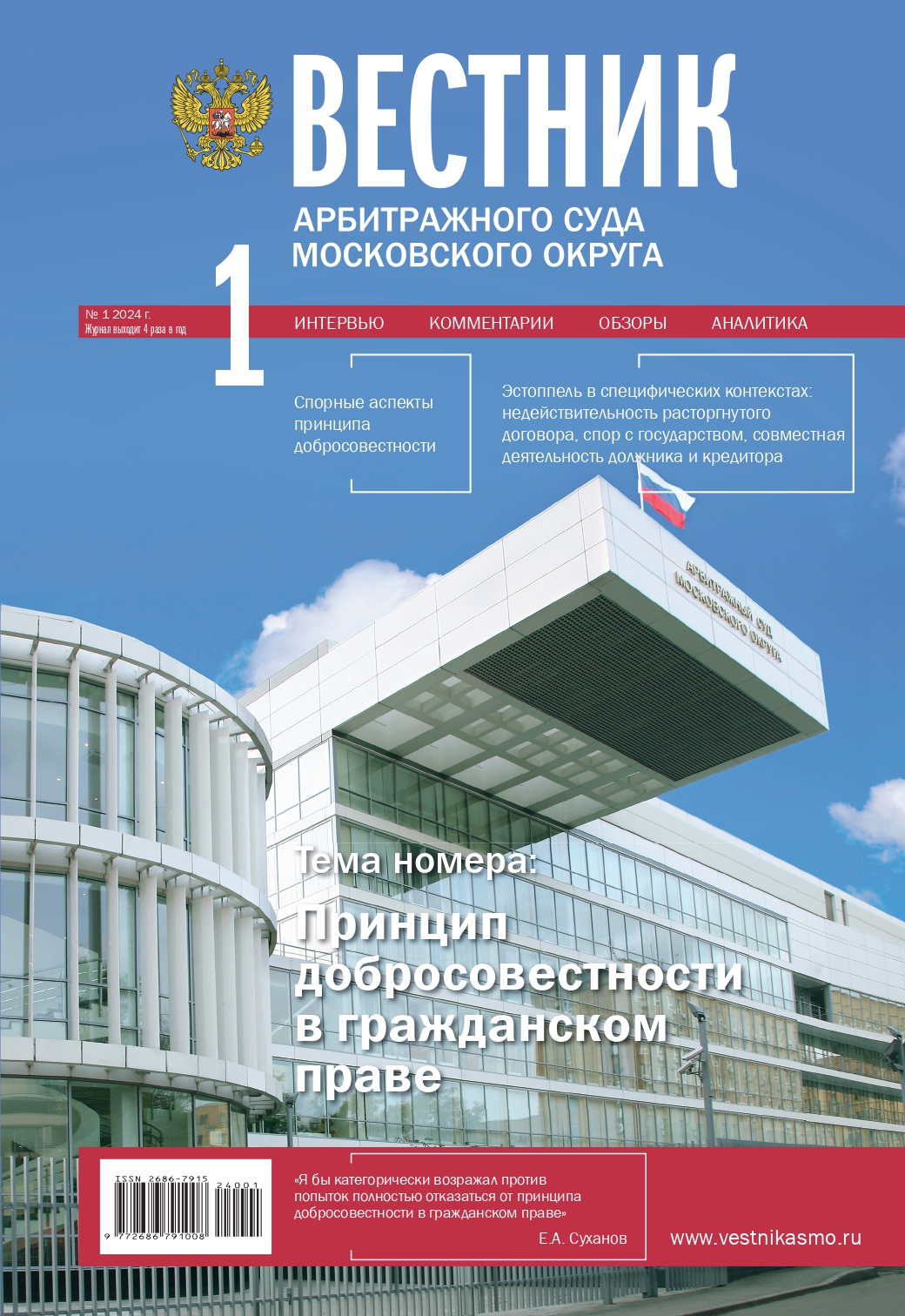Courts News
News of Moscow District Courts
Interview of the issue
Sukhanov E.A. I would strongly object to attempts to completely abandon good faith in civil law
Topicality
Subsidiary liability of a director for the debts of a company, administratively excluded from the Unified State Register of Legal Entities
Analytics: Good faith in civil law
Lugmanov R.R. Controversial aspects of the principle of good faith
The author of the article emphasises the unpopular understanding of the principle of good faith in its functional aspect.
There is every reason to believe that such a pragmatic approach will allow the practice to make significant progress and develop skills in finding a balance between the competing interests of turnover participants.
This approach will help to accumulate model solutions of similar cases, which will serve as a reference point for turnover participants who take into account the rights and legitimate interests of others. It will also be a reliable support for the courts revising the disputable relations of the parties. Some weaknesses of the usual division of good faith into objective and subjective ones are revealed.
The question about the real role of presumption of good faith is raised and a unique answer to the question is offered.
Keywords: principle of good faith, subjective good faith, guilt, presumption of good faith, functional approach
DOI: 10.46279/ASMO.2024.38.35.001
A.E. Kirpichev Estoppel in Specific Contexts: Invalidity of a Terminated Contract, Dispute with the State, Joint Activities of a Debtor and a Creditor
The article is devoted to the analysis of the application of the estoppel principle in three specific contexts of legal relations: recognition of a terminated contract as invalid, application of estoppel in legal relations involving the state, and the influence of estoppel on an obligatory legal claim in the presence of an agreement on joint activities. Using comparative legal, historical-legal, formal-legal methods and the method of legal qualification, the author comes to the conclusion that the specific context of legal relations does not exclude the application of estoppel but requires taking into account the peculiarities of the relevant sphere and careful assessment of factual circumstances to ensure a balance of private and public interests.
Keywords: estoppel, Verwirkung, laches, public interest, simple partnership, unjust enrichment
DOI: 10.46279/ASMO.2024.84.83.002
T.P. Podshivalov Good faith and its criteria in judicial practice
The article considers the evolution of judicial practice on the understanding of good faith in civil law. Four successive stages are identified: the definition of good faith through the norms of morality and morality; consideration of good faith as a legal category; good faith as a standard of behavior of the average participant of civil turnover; good faith as a criterion of law, lawfulness of behavior. The article defines and reveals the properties of good faith and its antipode of bad faith.
Keywords: civil law, good faith, estoppel, judicial practice
DOI: 10.46279/ASMO.2024.73.93.003
K.S. Kovalev Judicial discretion and the principle of good faith in civil law. Arbitrazh (commercial) case law
The freedom of judicial discretion seems to be an interesting subject of research since the courts give good faith priority over special rules of law. In fact, even of one’s behaviour formally complies with legal norms, it may be recognised by the court as bad faith and unlawful, which suggests that courts should be given the opportunity to understand the core of each case in detail and make decisions not following formalities, but determining the essence of things. For the purpose of legal certainty it seems necessary to form a uniform judicial practice regulating, in particular, the issues of application of the principle of good faith in resolving disputable aspects of various legal relations. The author points out the possibility of establishing by courts of some mandatory rules, different from the legal norms, which allows us to talk about the law-making role of courts. Thus the need to rethink the role of courts and their judicial practice regarding the application of the principles of civil law.
Keywords: judicial discretion, principle of good faith, rule of law, judicial practice, legal guarantee, legal ideology
DOI: 10.46279/ASMO.2024.57.66.004
N.V. Zaytseva Application of the principle of good faith in the process of creating and protecting
intellectual property
The article discusses the application of the principle of good faith in the creation, design and use of intellectual property in civil circulation, such as patenting objects, trademarks and secrets of production (know -how). The analysis of the judicial practice of the Russian Federation and foreign countries on the protection of exclusive rights to patents, know -how and trademarks. The approaches to the doctrinal qualification of production secrets, the conditions for transferring commercial secrets and the potential for protecting such objects in the conditions of the confidentiality regime are determined. The main elements of the standard of bona fide behavior of all participants in the legal relations arising in the field of circulation of intellectual property are revealed.
Keywords: the principle of good faith, objects of intellectual property, secrets of production (know how), patents, trademarks, a bona fide acquirer
DOI: 10.46279/ASMO.2024.89.74.005
D.V. Murzin Bad faith of foreign trademark owners as a ground for refusal to protect a right
The article is devoted to the consideration of issues related to the establishment of bad faith of foreign trademark right holders who left the Russian market due to their adherence to the policy of anti-Russian sanctions. The situation related to the restriction of access to the Russian market of marked goods is distinguished from the situation related to the appropriation by Russian users of means of individualization of unfair foreign right holders. With regard to the latter situation, it is proposed to distinguish between the claims of an unfair foreign right holder on the application of liability measures and defense measures. It is substantiated that the claimant’s bad faith may lead to the refusal to satisfy his claims for the application of liability measures against the infringer, but is not a ground for refusal to satisfy his claims for the application of protective measures.
Keywords: objective good faith, unfair competition, abuse of right, trademark, exclusive right
DOI: 10.46279/ASMO.2024.49.38.006
V.G. Dzhioev On the implementation of the principle of good faith in the administration of justice through the use of elements of electronic legal proceedings in the arbitration process
The article considers the implementation of the principle of good faith in the context of digitalization of legal proceedings. This principle is not clearly defined in legislation, but it is undoubtedly appropriate in the administration of justice. The author notes that electronic technologies, when introduced into the practice of justice, have a significant impact on the basic principles of justice, which requires scientific understanding, which today lags behind the development of technologies and the practice of their use.
Keywords: justice, the principle of good faith, principles of justice, digitalization, electronic court proceedings
DOI: 10.46279/ASMO.2024.19.59.007
A.M. Eloev The concept and subjects of good faith in arbitration proceedings
The article is devoted to the study of the concept of good faith in the arbitration process, the criteria for determining good faith are studied, the persons in relation to whom conclusions can be drawn about conscientious procedural behavior are determined.
Keywords: arbitration procedure, good faith
DOI: 10.46279/ASMO.2024.19.35.001
Analytics: Open Tribune
A.V. Koval’ Certain issues of protection of public interests when commercial courts consider disputes arising from energy supply contracts
The article is devoted to the scientific comprehension of the process of formation, development and current state of the legal institute of energy supply as a general legal structure, which mediates the turnover of such a specific commodity as energy (electric energy, thermal energy, gas, water etc.). The author considers the peculiarities of legal regulation of supply of certain types of energy through the connected network; the specifics of conclusion, amendment and termination of public energy supply contracts from the point of view of the need to ensure public interests of consumers, as well as the balance of private and public interests in the field of energy supply. The main directions of development of judicial and arbitrazh (commercial) practice in the sphere of energy supply are also analysed, legal positions of the highest judicial instances and the Moscow District Commercial Court on the most important and problematic issues of judicial practice in the specified sphere are given.
Keywords: energy supply, public energy supply contract, energy supply through the connected network, supply of communal resources, provision of communal services, court and arbitration practice in the field of energy supply
DOI: 10.46279/ASMO.2024.63.43.008
T.I. Metshin Contractual and legal regulation of investment relations in the mechanism of functioning of legal incentives and restrictions of investment activity in the field of construction
On the basis of contractual-legal regulation of investment relations the article studies how the mechanism of legal incentives and legal restrictions of investment activity is functioning in the sphere of construction. In order to prove that investment relations are mediated by various contractual forms, the author gives examples of differentiation of investment agreements with other contractual constructions on which the toolkit of legal incentives and restrictions depends. The reasons for the diversity of contractual legal constructions within the framework of regulation of investment relations in the sphere of construction are considered. Normative legal acts and court decisions, which can be used as a basis of a legal contractual model common for all types of investment legal relations, capable of reflecting the characteristic features of investment as an activity different from entrepreneurial activity, are studied. The conditions of investment agreements, which under certain circumstances are recognised as either legal incentives or legal restrictions of investment activity in the sphere of construction, are also considered.
Keywords: investment legal relations, investment agreement, legal incentives and legal restrictions, construction
DOI: 10.46279/ASMO.2024.66.48.009
A.A. Solovyov Ethical principles in the exercise of judicial office: the experience of the French Republic
Judges are guided by certain ethical principles in the administration of justice. At the same time, such principles also apply to the performance of official interaction by judges. The author considers the foreign experience of regulating the above ethical aspects on the example of the French Republic. The relevant provisions are contained in the Compendium of Ethical Obligations of Magistrates — a single act adopted by the supreme body of the professional community. The implementation of such an important ethical principle as respect and consideration for others in the course of magistrates’ official interaction is analysed. In addition, the chapter ‘Magistrates, lawyers and other auxiliary staff of the judiciary’, contained in the section ‘Annexes’ of the Compendium, is considered.
Keywords: judicial ethics, foreign experience, French Republic, ethical obligations, magistrates, official interaction
DOI: 10.46279/ASMO.2024.15.41.010
Scientific Advisory Council
Minutes No. 26 of the meeting of the Scientific Advisory Council of the Moscow District Commercial Court held in a combined format
Protocol Decision No. 2 of the Presidium of the Moscow District Commercia Court


